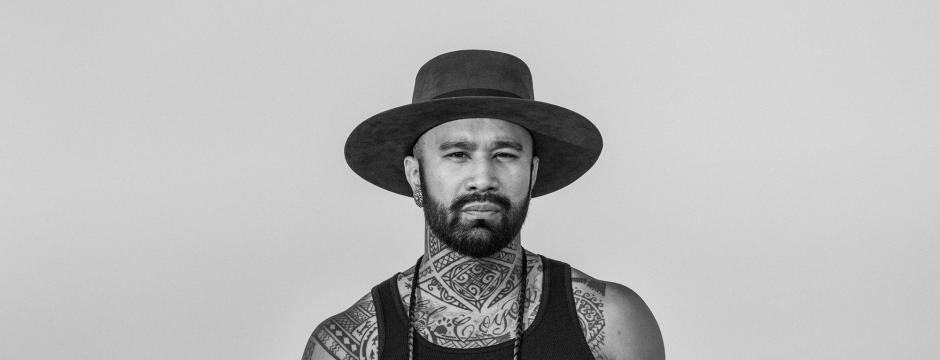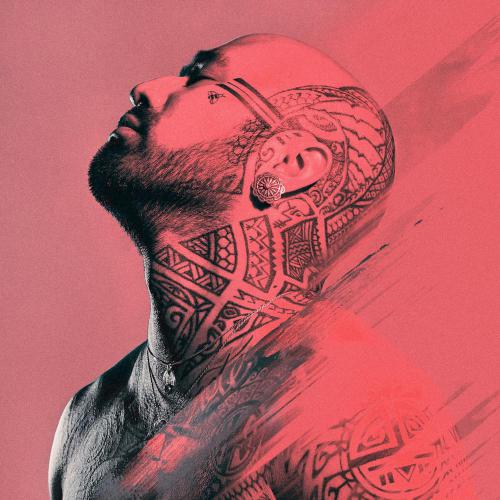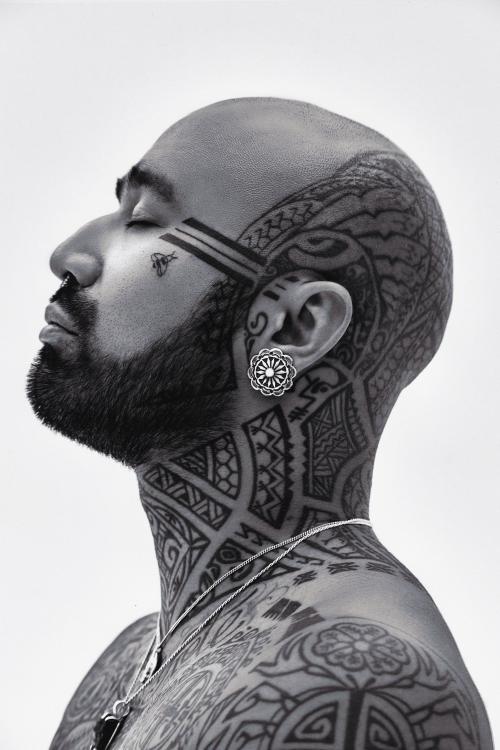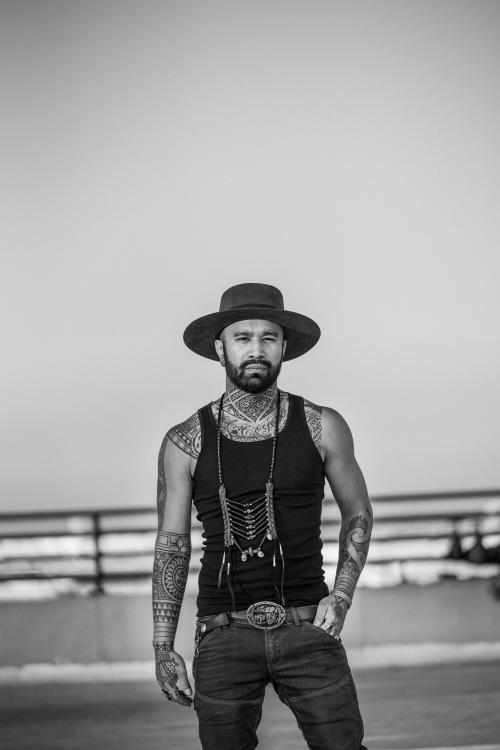Band: Nahko And Medicine For The People
Album: Take Your Power Back
VÖ: 15.05.2020
Label/Vertrieb: SideOneDummy / 375 Media GmbH / Cargo
Website: http://nahko.com
“This album came out of a reawakening,” says Nahko. “I found myself entering a new chapter in my life, and writing these songs was my way of processing all the changes I was going through.”
While Nahko has built his career on deeply personal, reflective songwriting, his extraordinary new album, ‘Take Your Power Back,’ is far and away his most profound, revelatory, and fully realized collection yet. Recorded in Los Angeles and Executive Produced by cut&dry, the record grapples with grief, trauma, and reconciliation, learning to face heartache head on and embrace the peace and serenity that comes with understanding and acceptance. As heavy as all that may sound, the music here is as uplifting and infectious as anything Nahko has ever released, blending socially conscious folk and rock with soulful, alt-R&B, genre-bending production. These are songs of growth, of courage, of resilience. They’re testaments to the beauty and evolution that can come from fully inhabiting our pain, and they’re proof positive that our true power—spiritual, physical, and emotional—inevitably comes from within.
“All of our great teachers have taught us that our inner heaven is the path to enlightenment, to happiness, to self-love and becoming whole,” explains Nahko. “Taking my power back, to me, meant exploring an entire landscape of recovery. It meant the rebuilding of a young, lost cub on a journey to find himself and love himself in a world that’s seemingly pitted against him.”
Much has been written about Nahko’s remarkable journey to find himself over the years, and it’s a story that’s still unfolding. Born to a Puerto Rican/Native American mother and a Filipino father, Nahko was adopted by a white, conservative, Christian family in Oregon and raised under the name David Bell. He later learned that his birth was the result of a rape, that his biological mother had been fourteen and sold into sex work at the time he was conceived, and that his biological father had gone on to be murdered. A sixth-generation Apache, he took on the moniker of Nahko—a play on his middle name, Nahkohe-ese, which translates to Little Bear—as a way of reclaiming his roots, and in his late teens and twenties, he began traveling the country, spending stints living as far afield as Hawaii and Alaska as he wrestled with identity, purpose, and perception.
“I rushed into my twenties with a handful of songs and fierce sense that no one would ever control me,” says Nahko. “I was headstrong and deeply angry with society. I didn’t trust anyone, and I didn’t think much about the music industry. I just knew that I enjoyed writing songs and had a passion for sharing them.”
Backed by his band, Medicine For The People, Nahko released his debut album, ‘On The Verge,’ in 2011, but his true breakthrough came two years later with ‘Dark As Night.’ The record was a critical and commercial breakout, landing in the Top Ten on the Billboard Heatseekers Chart and earning the band festival slots at Outside Lands, Electric Forest, Wanderlust, Bumbershoot, and more. Over the next four years, Nahko would go on to release two more celebrated albums with his band, solidifying his reputation along the way as an outspoken activist and advocate for both social and environmental justice. It was meaningful work, to be sure, but it also took an undeniable toll.
“There were no boundaries between my personal and professional life,” reflects Nahko. “I was campaigning for all these different organizations and spinning all these different plates and caring for so many other people’s needs that there was nothing left for myself at the end of the day. I realized that I’d been using my music and my activism as a shield, as a way to bypass the important work of my own healing.”
So, for the first time in years, Nahko decided to be still. He settled back down in the Pacific Northwest and began attending joint therapy sessions with his birth mother. He recommitted himself to his career, making personnel changes both onstage and off, and gave himself the time and space to write in ways he’d never experienced before.
“I had half a year just to cultivate and create on a deeper level,” he explains. “I’d obviously written very personal songs before, but I realized that I hadn’t allowed myself to explore some of the darker parts of my psyche because I’d never had the language for it. For the first time, I saw just how much work I needed to do, and while it was painful, sometimes you have to go through the mud to find the flowers.”
‘Take Your Power Back’ is indeed a veritable garden of revelation and insight. Album opener “Fourth Door,” which features Joseph’s Natalie Closner Schepman, speaks to the importance of grieving and mourning, while the soaring lead single “Lifeguard” and waltzing “Slow Down” meditate on the need for self care, and the striking “Give It All” and searing “Dear Brother,” which features environmental activist and hip-hop artist Xiuhtezcatl, search for a more spiritual definition of home and family. Accountability is key here, and songs like the profoundly funky “Take Your Power Back,” poignant “Twisted,” and probing “Part Problem” all recognize that no matter our circumstances or origins, we’re each ultimately responsible for our own path in life.
“Admitting you’re part of the problem can be difficult,” says Nahko, “but raising your hand and asking for help when you need it is essential. It’s the only way you can learn to love yourself and forgive yourself.”
As much as the record looks to the future, it’s also laced with reminders of Nahko’s past, weaving together a broad range of genres and traditions from around the world. The collection begins with a direction song delivered by Nahko’s uncle in the Taino language (fans might recognize this as a callback to the band’s last album ‘HOKA,’ which opened with a similar prayer in the Lakota language); the “Oli Kukulu” interlude highlights a poem read by Nahko’s aunt, Pua Case, a protector of the sacred Mauna Kea in Hawaii; and later in the album, Nahko shares an interlude rendered in Ilocano, one of the three most spoken languages in the Philippines. The Afrobeat-tinged “Honor the Earth,” meanwhile, offers a modern take on the Great Law Treaty at Lake Onondaga, which led to the creation of the Iroquois Confederacy (and modern American democracy), and the Paul Simon-esque “Bend Like The Willow” draws on Nahko’s experiences in the sweat lodge.
“Each of the last two years on my birthday, I’ve gone on a vision quest in this sweat lodge I built with the guidance of my elder, Uncle Doug Goodfeather,” says Nahko. “I go in for 24 hours with my intentions and my prayers, and I come out cleaned off and with new perspective.”
It’s a fitting metaphor for an artist in the midst of such a profound emotional and creative reawakening. ‘Take Your Power Back’ marks the beginning of a bold new journey for Nahko. He hopes it does the same for listeners.
Infos zum vorherigen Release:
Band: Nahko
Album: My Name Is Bear
VÖ: 20.10.2017
Label: Side One Dummy / Cargo
Website: www.nahko.com
Diese Neuigkeit wird seine Fans vor Freude in die Hände klatschen lassen: der gefeierte Künstler NAHKO BEAR, Sänger und Mastermind von MEDICINE FOR THE PEOPLE, hat heute bekanntgegeben das sein langerwartetes erstes Solo-Album “My Name Is Bear” am 20. Oktober 2017 erscheinen wird.
“My Name Is Bear” handelt von NAHKO´s prägenden Jahren als er als junger Mann durch die wilden Landschaften von Alaska, Hawaii und Louisana reiste und ist eine Sammlung von tief persönlichen Songs die die Geschichte seiner Entwicklung als Künstler erzählen. “Ich fand meine Mutter als ich 21 Jahre alt war. Die Lieder dieses Albums sind eine Sammlung von Geschichten vor dieser Zeit, geschrieben im Alter von 18 – 21 Jahre. Sie handeln vom älter werden, der ersten Liebe, psychedelischen Offenbarungen, jugendlichem Leichtsinn und Klarträumen.”
Während der großflächige Sound von Medicine For The People’s sechs Mann starker – momentan pausierender – Band das hatte, was ihnen weltweit ausverkaufte Konzerte bescherte, kommt “My Name Is Bear” mit einem wesentlich leichteren, sommerlichen Gefühl. Eine bewusste Entscheidung die eine weitere Facette NAHKO´s Kunst und Geschichtenerzählens zeigt.
“My Name Is Bear ist eigentlich das Prequel zu den Medicine For The People Alben. Dort wo alles seinen Ursprung hat, bevor dieses Kapitel überhaupt begann. Ich hatte das Gefühl, dass ich meine Schritte erst zurückverfolgen musste, bevor ich weiter nach vorne gehen konnte”.
“Die Geschichten sind aus meiner Perspektive geschrieben, als ich sehr jung war, am Abgrund von Allem was noch kommen sollte. Ich habe jahrelang auf den richtigen Zeitpunkt gewartet um diese Songs zu veröffentlichen. Die Zeit ist jetzt,” verrät NAHKO BEAR.
Englische Bio:
Tourdaten: 20.11.: Hamburg - Fabrik , 21.11.: Köln – Kulturkirche, 22.11.: Berlin - Bi Nuu, 23.11.: München - Technikum
It sounds like the logline for a classic sixties film…
An Oregon native leaves home at 18, follows love from Alaska to Louisiana only to learn about heartbreak the hard way, meets his birth mother for the first time, eventually settles in Hawaii, and launches a successful band. It isn’t the fulfillment of some loose end in Easy Rider or Five Easy Pieces though. It’s the origin story of Nahko captured on his 2017 solo offering, My Name Is Bear [Side One Dummy]. The album predates his rise to mythos among diehard fans in Nahko and Medicine for the People, and it’s an important piece of the puzzle that is Nahko.
Collecting music he penned between the pivotal ages of 18 and 21, the musical maverick appropriately describes the 16-track journey as “a prequel.”
“It’s the first chapter,” he elaborates. “I leave home at the beginning. On the back end, I meet my birth mother at 21, everything changes, and the Medicine for the People catalog begins. It was about coming of age and shedding that skin. When you’re on your own, those are the first steps to freedom. You have to take care of yourself and survive in a world with the tools you have. For me, those tools were my guitar, my songwriting, and my thumb to hitchhike. 95% of the tracks were written during or about psychedelic trips. There’s a tinge of real mystical revelation as I went from Alaska to Hawaii. I became open to other spiritual texts, and they transformed me. I was on the road, in love, and everything was amazing, but I kept asking myself, ‘What the fuck does this all mean?’”
My Name Is Bear might incite some of the same questions. Artfully merging rustic acoustic guitars, upbeat energy, tribal flavors, fiery percussion, and ponderous lyrics, these recordings reflect the soul and spirit fans have come to know and love from his work in Medicine for the People, while venturing into decidedly more “rocking” and “personal” territory, as he puts it.
Along the way, he realized who he was. “I came from a broken indigenous home, but I was raised in a beautiful, privileged white home by my adoptive parents,” he says. “It was pretty confusing as I began to come of age because I knew I didn’t come from that household, but somehow through my music I was able to garner the attention of many young people going through the same thing and coming to a similar conclusion. My music did not define me at 18-21 the way it does now. It was my comfort zone. I turned to it to get me through all of the transitions. I had no definition of life at the time. Music is my language, that is certain. It is my way to get in, out, over, and under. It’s my bridge. I can connect with people and many other things with it.”
Strengthening that connection, Nahko introduces this collection with the lead-off and first single “Dragonfly.” Fingerpicked acoustic guitar builds into an unshakable melody punctuated by an African-style beat and chirping birds as he carries the chant, “To my former dragonfly, I resist and I survive.” The companion video, starring Nahko’s friend Paris Jackson, brings the narrative to life vividly.
“I wrote that at 18,” he recalls. “It’s a special one about following my heart in relation to a first love. I was very enamored with her. We met in Alaska, and she had a similar story to my birth mother. I followed her to Louisiana by way of a very long road trip. We spent four months in a house in the Deep South hanging out. It came from surviving that first year away from home. It was a special piece for me.”
He pays homage to the influence of Ram Dass’s Be Here Now with the swaggering electric guitar, groovy bass, and bright horns of “Be Here Now”—originally penned upon his arrival in Hawaii. The gorgeous conclusion “Die Like Dinoz” nods to his experience in a Hawaiian treehouse at the base of a volcano as it compares two lost dinosaurs to lovers who lose their way.
As much as My Name Is Bear serves as a prequel to Medicine for the People, it can certainly be construed as the foundation for meeting his mom as well. To rewind even further, Nahko’s birth mom gave him up for adoption as she was just 15-years-old. She would be thrust into unthinkable circumstances but managed to send letters and photos until he turned five. At 17, his parents handed over the correspondence. In 2007 following his return to Portland from Hawaii, he Googled her name on August 6. Turns out, his birth mother lived 15 minutes away. “I drove there and, there she was, my mom,” he continues. “My two sisters, their kids, my two brothers…everyone. Mom was crying. I was crying. The first thing she asked was ‘What do you do?’ I shrugged and said, ‘I play music.’ It literally happened like that—all by divine intervention. I picked up, left Hawaii, and came home to not so randomly discover my mom lived basically down the street from where I grew up.”
Consequentially, this transpired towards the end of the period chronicled on My Name Is Bear. He penned “Early February” about it.
“It’s the only song that has anything to do with my birth mother or my family,” he says. “It’s about identity. That link ties to my other records, because they’re full of stories. My Name Is Bear celebrates becoming a man.”
During 2016, Nahko began combing his catalog for choice tunes from that crucial period. In the midst of that process, he uncovered a box of tapes where he audio journaled his travels. Those comprise the four “Interludes.”
“This was long before Notes on the iPhone,” he laughs. “I would literally record a daily log on a RadioShack tape recorder. It’s a time capsule through California, my first Burning Man, busking from Portland to Maine, and picking up hitchhikers. The tapes couldn’t have been more perfect for the album.”
In the title, he also subconsciously embraces his given moniker Nahko, which means “bear.”
“I reclaimed the name at this time,” he goes on. “I was going by my adopted name of David until I got to Hawaii and a friend encouraged me to go by Nahko. It’s a statement to myself. I’m no longer a little bear. I’ve reached a place where I’ve progressed through this journey of music. I can share these songs from a very specific period today.”
At the end of the day, this prequel sets the stage for a whole lot more from Nahko though.
“To be honest, I decided to make this last year as the world was changing,” he leaves off. “I know I could go deep on Medicine for the People, but I had to go back in time for myself, clean out the closet a little bit, and give listeners something that feels good, but makes them think. I hope in making them feel good for an hour; it makes them feel better. That’s how I feel.”






